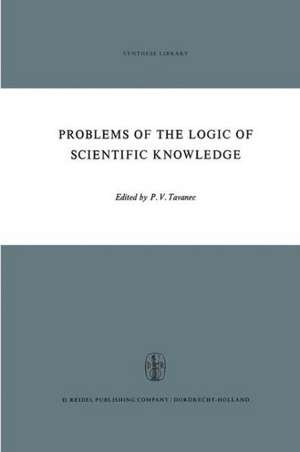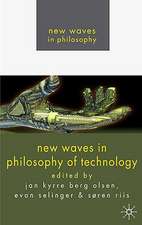Problems of the Logic of Scientific Knowledge: Synthese Library, cartea 25
Editat de P.V. Tavanecen Limba Engleză Hardback – 31 iul 1969
Din seria Synthese Library
- 15%
 Preț: 638.43 lei
Preț: 638.43 lei - 18%
 Preț: 989.98 lei
Preț: 989.98 lei - 15%
 Preț: 596.69 lei
Preț: 596.69 lei - 18%
 Preț: 903.93 lei
Preț: 903.93 lei - 15%
 Preț: 586.88 lei
Preț: 586.88 lei - 15%
 Preț: 696.50 lei
Preț: 696.50 lei - 18%
 Preț: 892.90 lei
Preț: 892.90 lei - 15%
 Preț: 643.34 lei
Preț: 643.34 lei -
 Preț: 282.33 lei
Preț: 282.33 lei - 5%
 Preț: 372.19 lei
Preț: 372.19 lei -
 Preț: 443.10 lei
Preț: 443.10 lei - 15%
 Preț: 637.59 lei
Preț: 637.59 lei - 18%
 Preț: 958.88 lei
Preț: 958.88 lei - 15%
 Preț: 642.36 lei
Preț: 642.36 lei - 18%
 Preț: 1230.66 lei
Preț: 1230.66 lei - 15%
 Preț: 642.83 lei
Preț: 642.83 lei - 18%
 Preț: 1000.39 lei
Preț: 1000.39 lei -
 Preț: 389.70 lei
Preț: 389.70 lei - 15%
 Preț: 637.28 lei
Preț: 637.28 lei - 18%
 Preț: 952.26 lei
Preț: 952.26 lei - 18%
 Preț: 1231.32 lei
Preț: 1231.32 lei - 15%
 Preț: 645.96 lei
Preț: 645.96 lei -
 Preț: 395.85 lei
Preț: 395.85 lei -
 Preț: 400.47 lei
Preț: 400.47 lei - 18%
 Preț: 1225.48 lei
Preț: 1225.48 lei - 15%
 Preț: 638.89 lei
Preț: 638.89 lei - 18%
 Preț: 1232.09 lei
Preț: 1232.09 lei -
 Preț: 380.45 lei
Preț: 380.45 lei -
 Preț: 394.87 lei
Preț: 394.87 lei - 15%
 Preț: 640.37 lei
Preț: 640.37 lei - 15%
 Preț: 639.08 lei
Preț: 639.08 lei -
 Preț: 381.98 lei
Preț: 381.98 lei - 15%
 Preț: 643.00 lei
Preț: 643.00 lei - 15%
 Preț: 672.29 lei
Preț: 672.29 lei
Preț: 1231.01 lei
Preț vechi: 1501.23 lei
-18% Nou
Puncte Express: 1847
Preț estimativ în valută:
235.56€ • 246.56$ • 196.06£
235.56€ • 246.56$ • 196.06£
Carte tipărită la comandă
Livrare economică 31 martie-14 aprilie
Preluare comenzi: 021 569.72.76
Specificații
ISBN-13: 9789027700872
ISBN-10: 9027700877
Pagini: 448
Ilustrații: XII, 432 p.
Dimensiuni: 155 x 235 x 30 mm
Greutate: 0.83 kg
Ediția:1970
Editura: SPRINGER NETHERLANDS
Colecția Springer
Seria Synthese Library
Locul publicării:Dordrecht, Netherlands
ISBN-10: 9027700877
Pagini: 448
Ilustrații: XII, 432 p.
Dimensiuni: 155 x 235 x 30 mm
Greutate: 0.83 kg
Ediția:1970
Editura: SPRINGER NETHERLANDS
Colecția Springer
Seria Synthese Library
Locul publicării:Dordrecht, Netherlands
Public țintă
ResearchCuprins
The Logic of Scientific Knowledge.- Levels of Knowledge and Stages in the Process of Knowledge.- I. Differences Between the Problems, ‘Sensation-Thought’ and ‘Empirical-Theoretical’.- II. Basis of the Division of the Sentences of the Language of Science into Levels.- III. The Semantic System: Admissible Objects of Thought and Modes of Expression.- IV. Empirical and Theoretical Objects of Science.- V. Sentences Which Express Facts and Sentences Which Formulate Laws.- VI. Stages in the Process of Knowledge.- VII. Types of Explanation of Empirical Connections.- VIII. Stages in the Process of Knowledge, II.- Problems of the Logical-Methodological Analysis of Relations Between the Theoretical and Empirical Planes of Scientific Knowledge.- I. The Traditional Inductivist Approach to the Problem of the Relations Between Theoretical and Empirical Knowledge and its Limitations.- II. Critique of the Neopositivist Approach to the Analysis of the Relations Between the Theoretical and Empirical Levels of Scientific Knowledge.- III. Contemporary Logic of Science on the Relations Between Theoretical and Empirical Knowledge: The Connection of the Theoretical and Empirical Levels of Knowledge in the Structure of Hypothetical-Deductive Theory.- IV. Contemporary Logic of Science on the Relations Between Empirical and Theoretical Knowledge: The Problem of the Establishment of Logical Correspondence Between Theoretical and Empirical Knowledge.- Logical and Physical Implication.- The Deductive Method as a Problem of the Logic of Science.- I. Introduction.- II. Deduction and Deductive Inference.- III. Deductive System and Deductive Theory.- IV. Types of Deductive Systems.- V. Problems of the Logical-Epistemological Analysis of the Deductive Sphere of Knowledge.- Probability Logic andits Role in Scientific Research.- I. Introduction.- II. Systems of Probability Logic.- III. Probability Logic and Statistical Inference.- IV. Probability Logic and the Problem of the Selection of Hypotheses.- V. Probability Logic and the Problem of Confirmation of Hypotheses.- The Basic Forms and Rules of Inference by Analogy.- I. The General Schema of Inferences by Analogy.- II. Traditional Analogy.- III. Causal and Substantial Analogy.- IV. Analogy of Consequence.- IV. Analogy of Correlation.- VI. Functional-Structural and Structural-Functional Analogy.- On the Types of Definition and Their Importance for Science.- I. Preliminary Remarks.- II. Types of Definition.- III. The Problem of Definitions in Formal Systems.- IV. On the Importance of Definitions in Science.- Idealization as a Method of Scientific Knowledge.- I. The Abstraction of Identity.- II. Idealization.- III. Some Methodological Considerations.- The Statistical Interpretation of Fact and the Role of Statistical Methods in the Structure of Empirical Knowledge.- I. The Nature of Empirical Knowledge and the Principle of Verification.- II. The Statistical Nature of the Object and the Structure of the Construction of Empirical Knowledge.- Index of Names.















